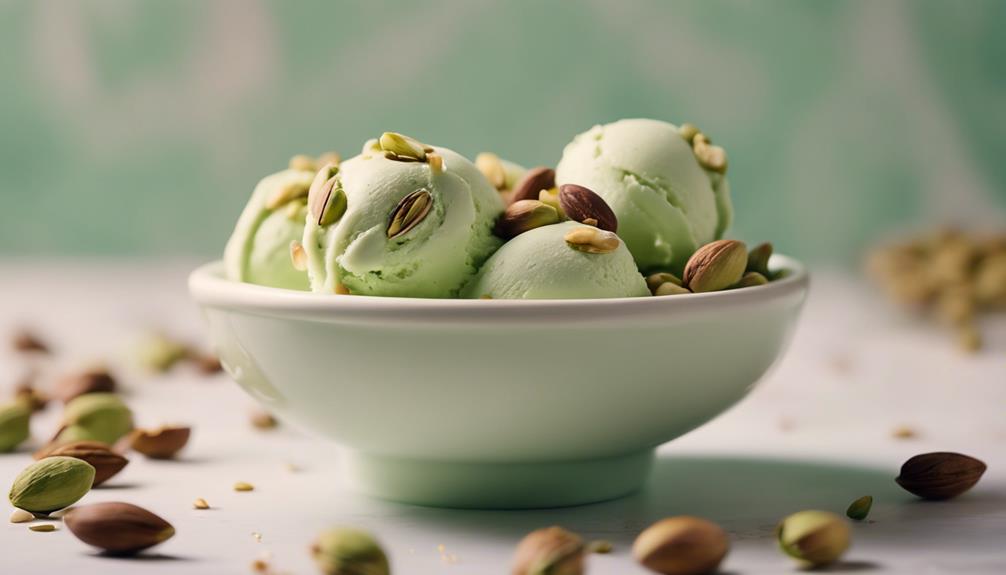When you indulge in frozen yogurt, you are treating your taste buds to a delightful blend of yogurt, sugar, and flavorings that all contribute to its delicious taste and creamy texture. The yogurt can either be whole milk or Greek, providing it with extra protein. Sugar is necessary for sweetness and to maintain the perfect consistency. However, be mindful of artificial ingredients and high sugar content that are commonly found in store-bought options. You can also make your own healthier frozen yogurt at home using fresh fruits and natural sweeteners. Interested in taking your frozen yogurt experience to the next level? There is more to discover.
Key Takeaways
- Frozen yogurt primarily consists of yogurt, sugar, and flavorings, which are essential for its taste and texture.
- Whole milk or Greek yogurt is commonly used for creaminess and higher protein content in frozen yogurt.
- Many store-bought options contain high added sugars, often exceeding 20 grams per serving, which can lead to health issues.
- Consumers should be cautious of artificial additives and seek organic options to avoid harmful ingredients.
Understanding Frozen Yogurt Ingredients
When making frozen yogurt, it's vital to understand the key ingredients like yogurt, sugar, and flavorings that can greatly affect the taste and texture.
A solid frozen yogurt recipe typically starts with whole milk or Greek yogurt, as these ingredients provide a creamier texture and higher protein content. If you want your creation to be smooth, opt for whole milk Greek yogurt.
Granulated sugar plays an important role in your frozen yogurt's sweetness and texture. You should use at least 3/4 cup of sugar per quart of yogurt to help prevent ice crystal formation. This is significant for achieving that delightful and creamy consistency you're after. While granulated sugar is a common choice, you might also consider alternatives like honey to add a different flavor profile.
Don't forget about the flavorings! Whether you're adding vanilla extract or experimenting with fruits, these ingredients can elevate your frozen yogurt experience.
Remember, the quality of your ingredients matters; opting for organic and natural products can lead to a healthier and more delicious treat.
Key Components of Frozen Yogurt

Understanding the key components of frozen yogurt helps you create a delicious and satisfying treat that balances flavor and texture. By focusing on these essential ingredients, you can craft a frozen yogurt experience that delights your taste buds.
Here are the four key components you should consider:
- Yogurt: The base of your frozen yogurt, made from milk fermented with live cultures, provides a tangy flavor and probiotic benefits.
- Cream: Adding cream (or alternatives like mascarpone) enhances the creaminess of your treat, reducing the iciness often found in yogurt-based desserts.
- Sugar: Sweeteners like sugar or honey are vital for flavor. Aim for at least 3/4 cup of sugar per quart of yogurt to achieve the best texture and taste.
- Frozen Fruit: Incorporating frozen fruit is an excellent way to add natural flavor and nutrition. It also contributes to a vibrant color and invigorating taste.
Nutritional Benefits of Frozen Yogurt

When you choose frozen yogurt, you're opting for a healthier dessert alternative that often packs fewer calories and less fat than traditional ice cream.
With nutrient-rich ingredients like Greek yogurt, you can enjoy a treat that supports muscle repair and gut health.
Plus, many frozen yogurts offer lower sugar options, letting you satisfy your sweet tooth without the guilt.
Healthier Dessert Alternative
Frozen yogurt offers a delicious and healthier dessert alternative, packed with beneficial nutrients and lower in fat and calories than traditional ice cream. If you're looking for a guilt-free treat, consider these four nutritional benefits of frozen yogurt:
- Lower Fat Content: Most frozen yogurt is made with low-fat or non-fat yogurt, making it a great option for those watching their fat intake.
- Protein Boost: Incorporating Greek yogurt can increase the protein content to around 10-15 grams per serving, aiding in muscle repair and helping you feel fuller longer.
- Reduced Sugar: Many homemade frozen yogurt recipes use less added sugar, with some containing only 7-10 grams per serving compared to over 20 grams in store-bought options.
- Customizable Nutrition: You can enhance your frozen yogurt with healthy add-ins like nuts, seeds, or dark chocolate, providing beneficial fats and antioxidants.
Nutrient-Rich Ingredients
Nutrient-rich ingredients in frozen yogurt not only enhance its flavor but also boost its health benefits, making it a smart choice for a sweet treat. The yogurt mixture, especially when made with whole milk Greek yogurt, packs about 11 grams of protein per serving, which supports muscle health and keeps you feeling full. Plus, incorporating fruits adds essential vitamins and antioxidants, enriching your dessert with fiber and nutrients.
Here's a quick look at some key nutrient-rich ingredients:
| Ingredient | Benefits | Common Use |
|---|---|---|
| Greek Yogurt | High in protein, supports muscle health | Base for yogurt mixture |
| Fresh Fruits | Provides vitamins, antioxidants, and fiber | Flavor addition |
| Honey | Natural sweetener, lower added sugar | Sweetening agent |
| Vanilla Extract | Enhances flavor without added sugar | Flavor enhancer |
| Probiotics | Promotes gut health and digestive function | Nutritional boost |
Lower Sugar Options
Opting for lower sugar options in frozen yogurt not only satisfies your sweet cravings but also supports a healthier lifestyle. By making simple ingredient choices, you can enjoy a delicious treat while keeping your sugar intake in check.
Here are four effective ways to create a lower sugar frozen yogurt:
- Use Greek yogurt: Its natural tanginess allows you to reduce added sweeteners while boosting protein content.
- Incorporate whole fruits: Fresh fruits enhance sweetness and flavor, adding essential vitamins and fiber without the extra sugar.
- Choose natural sweeteners: Ingredients like honey or liquid stevia can keep sugar levels manageable compared to traditional sweeteners.
- Experiment with flavors: Adjust the amount of sweetener or try flavor extracts to create satisfying low-sugar versions that still delight your taste buds.
Common Additives to Watch For

Many popular frozen yogurt brands include additives like artificial colors and flavorings that can pose health risks, so it's crucial to read labels carefully. You might find ingredients like Blue 1 and Red #40, which have been linked to concerns such as cancer and behavioral issues in children. Additionally, many frozen yogurts contain high fructose corn syrup, pushing added sugar content over 20 grams per serving. This can contribute to weight gain and chronic inflammation.
Another aspect to watch for is non-organic dairy, commonly used in frozen yogurt. This can expose you to antibiotics and growth hormones, raising potential health concerns related to various cancers. Furthermore, many brands incorporate harmful additives, including stabilizers and emulsifiers, which complicate ingredient transparency and can lead to unhealthy choices.
Since ingredient labels may not always disclose these harmful additives, you need to be vigilant and informed about what you're consuming. By taking the time to read labels, you can make healthier choices and enjoy your frozen yogurt without unnecessary risks to your health.
Misleading Marketing Practices

When you grab a cup of frozen yogurt, you might think you're making a healthier choice, but misleading marketing can trick you.
Many brands tout their products as 'organic' or 'homemade' while hiding artificial ingredients and excessive sugars.
It's essential to pay attention to ingredient labels so you can make informed decisions about what you're really eating.
Ingredient Transparency Issues
Ingredient transparency in frozen yogurt often falls short, leaving you misled about what's really in your favorite treat. Many brands tout 'homemade' or 'organic' labels, but the reality is different. Here are some key issues to take into account:
- Artificial Ingredients: Many frozen yogurts contain artificial flavorings and preservatives that compromise health benefits.
- Added Sugar: A single serving can pack over 20 grams of added sugar, often sourced from high fructose corn syrup, which is linked to various health problems.
- Non-Organic Dairy: Many products use non-organic dairy, exposing you to antibiotics and growth hormones that raise health concerns, including potential cancer links.
- Lack of Ingredient Transparency: Brands may not clearly disclose all ingredients, making it hard for you to make informed choices about what you're consuming.
These misleading marketing practices can cloud your judgment, so it's essential to scrutinize labels and ask questions when enjoying your frozen yogurt.
Misleading Health Claims
Misleading health claims often accompany the enticing labels of frozen yogurt, leaving you uncertain about the true nutritional value of your favorite flavors. Brands often promote their products as 'homemade' or 'organic,' yet many contain artificial ingredients and additives that contradict these assertions. This lack of ingredient transparency can mislead you into thinking you're making a healthier dessert choice.
For instance, popular brands like Pinkberry have faced criticism for their ingredient lists, which reveal hidden added sugars and preservatives. You mightn't realize that some frozen yogurt treats pack over 20 grams of added sugars per serving, including high fructose corn syrup. This can contribute to health issues like weight gain and chronic inflammation.
As a consumer, it's important to be aware of these misleading health claims and the potential risks associated with them. Understanding the nutritional value of what you're consuming is vital.
Always check ingredient lists carefully to make informed choices about your frozen yogurt. Increased awareness about ingredient sourcing can empower you to select treats that truly align with your health goals.
Health Risks Associated With Ingredients

Many popular frozen yogurts can pose significant health risks due to harmful ingredients like artificial colorings and excessive sugar. While you might think you're indulging in a healthier treat, the reality can be quite different.
Here are four health risks associated with frozen yogurt ingredients:
- Artificial Colorings: Ingredients like Blue 1 and Red #40 have been linked to cancer and behavioral issues, especially in children.
- Excessive Added Sugar: Many frozen yogurts contain over 20 grams of added sugar per serving, which can lead to weight gain and chronic inflammation.
- Non-Organic Dairy: The use of non-organic dairy raises concerns about exposure to antibiotics and growth hormones, linked to various health issues, including cancers.
- Artificial Flavorings: Common additives in frozen yogurt products often mislead you about their nutritional value, hiding harmful components beneath a façade of “healthiness.”
Alternatives to Store-Bought Frozen Yogurt

When you're looking for a healthier treat, homemade frozen yogurt offers a delicious alternative that skips the harmful additives found in store-bought varieties. By using whole ingredients like frozen fruit and Greek yogurt, you can whip up a nutritious dessert that satisfies your sweet tooth without the extra sugars.
If you're not quite ready to make frozen yogurt from scratch, consider these alternatives:
| Alternative | Description | Benefits |
|---|---|---|
| Blended Frozen Bananas | Blend frozen bananas with nut butter for creaminess | No artificial ingredients, nutritious |
| Organic Frozen Yogurt | Choose options from natural food stores | Fewer hidden additives, quality focus |
| Smoothies | Use frozen fruits blended with yogurt | Flavorful and healthy without excess sugar |
| Fruit-Based Popsicles | DIY popsicles using yogurt and fruit | Fun, creative, and free from processed ingredients |
These options allow you to enjoy a frozen yogurt experience while prioritizing your health. Embrace these healthier alternatives to store-bought options and get creative in the kitchen!
Homemade Frozen Yogurt Recipes

Making your own frozen yogurt opens up a world of simple recipe variations and healthier ingredient alternatives.
You can easily customize flavors and sweetness levels to fit your taste, all while skipping the additives found in store-bought options.
Let's explore some easy recipes and swaps that can take your homemade frozen yogurt to the next level!
Simple Recipe Variations
You can create countless simple variations of homemade frozen yogurt by combining yogurt, frozen fruit, and your choice of sweetener. This easy-to-make treat not only tastes great but also allows you to control the ingredients. Here are four delicious variations to try:
- Berry Bliss: Blend Greek yogurt, mixed frozen berries, and honey for a sweet and tangy treat.
- Tropical Twist: Combine coconut yogurt with frozen mango and a splash of pineapple juice for a rejuvenating tropical flavor.
- Chocolate Delight: Mix plain yogurt with cocoa powder, frozen banana, and a touch of maple syrup for a rich, chocolatey indulgence.
- Nutty Banana: Blend yogurt with frozen banana and a spoonful of almond butter for a creamy, nutty dessert.
To achieve a creamier texture, consider using whole milk Greek yogurt or adding cream to your mixture.
Don't forget, you can also incorporate flavor extracts or other ingredients for unique taste profiles.
With homemade frozen yogurt, you can enjoy endless flavor combinations while avoiding artificial additives found in commercial products. Enjoy experimenting with your favorites!
Healthier Ingredient Alternatives
Explore healthier ingredient alternatives to create a delicious and nutritious homemade frozen yogurt that satisfies your cravings without the guilt.
Start with whole-milk Greek yogurt for a creamier frozen yogurt packed with protein, making it a more satisfying option than traditional low-fat yogurts.
Incorporate frozen fruits like strawberries or bananas to add natural sweetness and a boost of vitamins and antioxidants.
For sweetening, try a mix of honey and sugar. This combination allows you to maintain control over sugar content, helping you achieve a lower-sugar treat compared to many store-bought varieties.
If you want that perfectly smooth texture, consider adding a tablespoon of corn syrup; it helps prevent large ice crystals from forming, ensuring a delightful consistency.
Don't forget about flavor! Add a splash of vanilla or almond extract to enhance the taste without relying on artificial flavoring agents often found in commercial options.
With these simple swaps, you can enjoy a homemade frozen yogurt that's not only delicious but also healthier, making it the perfect guilt-free treat for any occasion.
Ingredient Variations for Customization

Customizing frozen yogurt is a delightful way to craft a treat that perfectly suits your taste preferences. You can create a deliciously unique dessert by mixing and matching different ingredients. Here are four variations to contemplate for your next creation:
- Creamy Base: Swap out low-fat yogurt for whole milk Greek yogurt or add rich cream to enhance the creaminess and nutritional value of your frozen yogurt.
- Frozen Fruits: Incorporate frozen fruits like strawberries, bananas, or mangoes for natural sweetness and vibrant color that brightens up your dessert.
- Flavor Extracts: Experiment with flavor extracts such as vanilla, almond, or citrus zest to add a personalized taste experience that transforms your yogurt into something special.
- Sweetener Choices: Tailor your sweetness by using honey, maple syrup, or liquid stevia, allowing you to maintain a healthier profile while satisfying your sweet tooth.
With these ingredient variations, you can truly make your frozen yogurt a reflection of your personal tastes, turning every scoop into an enjoyable treat.
Consumer Awareness and Feedback

Consumer awareness around frozen yogurt ingredients is increasingly critical, as many are often surprised to find hidden sugars and artificial additives lurking in their favorite treats. It's crucial to read labels carefully, as ingredient transparency is often lacking in marketing claims. You might think you're making a healthy choice, only to discover excessive sugar content and unhealthy additives.
User feedback shows a growing concern for what's actually in your frozen yogurt. People express disappointment when they realize their go-to options aren't as wholesome as they believed. This has led to a rise in community discussions about healthier alternatives, including homemade recipes that allow for better control over ingredients.
Additionally, many consumers now prefer organic options, driven by a desire to avoid harmful additives and antibiotics often found in non-organic varieties. This shift highlights the importance of being vigilant about what you consume.
Frequently Asked Questions
What Is in Frozen Yogurt Ingredients?
When you're curious about frozen yogurt ingredients, you'll find yogurt, sweeteners like sugar or honey, and sometimes artificial additives. Always check labels, as many brands might contain added sugars and other ingredients you might want to avoid.
Is Froyo Healthier Than Ice Cream?
Is froyo really healthier than ice cream? It often has less fat, but watch out for added sugars. Check labels, and remember, you're choosing what fits your lifestyle best—don't just go by marketing!
Is Frozen Yogurt a Healthy Treat?
Frozen yogurt can be a healthier treat, but it often contains high sugars and artificial additives. To truly enjoy its benefits, you should consider making it at home with wholesome ingredients and less sugar.
Does Frozen Yogurt Use Eggs?
When it comes to frozen yogurt, you might find it's not always a “piece of cake.” Most varieties don't use eggs, but some premium brands do. Always check the label to be sure.
Conclusion
In the world of frozen yogurt, knowing what's inside your treat is like being a chef in your own kitchen.
Just as you wouldn't toss random ingredients into a dish, you should be aware of what's in your frozen yogurt.
With choices ranging from healthy probiotics to sneaky additives, being informed helps you whip up a guilt-free dessert.
So next time you indulge, remember: knowledge is the secret ingredient to savoring every bite without a worry!
















